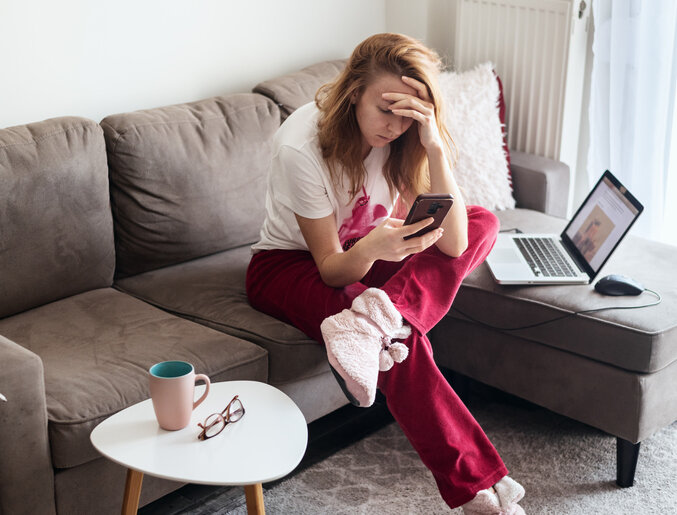Procrastination has more to do with managing our emotions than with time management.
Many had big plans for quarantine: reading more, learning a language, taking advantage of all that free time in productive activities but, as the pandemic progressed, many people faced anxiety, exhaustion and difficulty concentrating. COVID-19 has sparked a mental health crisis around the world, fueling bad habits like procrastination. And while many label procrastination as poor time management, it is an emotion management problem, according to Tim Pychyl, professor at Carleton University in Ottawa, who researches procrastination and its relationship to personal well-being.
Fuschia Sirois, who studies procrastination at the University of Sheffield, agrees with Pychyl. “People talk about procrastination as a time management problem because that’s what it looks like on the surface, right? But it actually has not very much to do with time management. It has to do with mood management,” she told VICE. But why do people prolong their tasks?
Because nothing happens if you put it off
Sometimes there are consequences for not immediately doing the tasks or pending tasks that we have to do, but at other times there are no consequences. According to Joseph Ferrari, a professor of psychology at DePaul University in Chicago, the same society encourages people not to do things early. He explains that “they punish us for being late to our culture, they don’t reward us for being early.” And when we internalize the message that there is no point in arriving early, we can apply it to whatever task needs to be done.
Professor Pychyl explains why it is essential to focus on how good it feels when completing a task rather than thinking about its stress. Making a to-do list is helpful, as marking your to-dos as completed will help you get more done by creating a feeling of efficacy.
The way you feel about doing something that makes you procrastinate
Fuschia Sirois, who studies procrastination at the University of Sheffield, told VICE that it is common for people to procrastinate when they feel insecure, especially if the task is new. “It’s a fairly simple equation: ess confidence equals more avoidance,” she says.
Another case is feeling incompetent or anxious about a task because you are worried that others will judge how you did it. A straightforward example is writing an email; many people put it off because someone else will see it, and they don’t know if what they wrote is the right thing to do. People also avoid tedious tasks, so they choose to procrastinate even if it takes less time than watching an episode of their favorite series.
You are using logic to try to trick yourself into correcting inherently emotional behavior
People often avoid doing something because it is associated with negative emotions such as feeling judged, or because it is something boring, new, or it simply scares us. And although actions such as dividing the project into small parts, organizing a schedule, cleaning the workspace, or other tips that one finds online might help make the environment less procrastinating, it does not help if it is an emotional problem.
For example, for a person who feels that they do not have the skills to perform an activity, gathering all the information and resources necessary to carry it out is a more viable option than having an orderly workspace. Sometimes people overthink things, making them bigger or more complicated than they really are. Having what you need to complete them can help.
You are caught in a spiral of shame
Sirois also explains that procrastinators often have low self-esteem; they tend to think that only they prolong tasks, thus generating negative emotions. Procrastinators avoid doing something they find unpleasant, and they suffer the pressure of being judged for it, thus avoiding it even more, forming a vicious circle. “All that self-criticism does, then, is generate more negative feelings about the task, which just makes you want to avoid it all the more,” Sirois said. “That’s why these things drag on.”
Not asking for help
Recognizing that procrastinating is something everyone does and normalizing it will help alleviate the guilt and shame. That is why talking to others about it is a great help to overcome it. Also, having support reduces stress by providing emotional support and a safe space for listening. Being kind rather than critical of yourself will make it easier to ask for help.
On the other hand, procrastination is not just about avoiding specific tasks or caused by emotional issues; procrastination has its roots in evolutionary development, with two key parts of the brain vying for control. National Geographic magazine explains more about it and breaks down the science behind procrastination, the effect the pandemic has had, and strategies to cope with it.
The science behind procrastination: Brain battles
In an article for the National Center for Biotechnology Information (NCBI), neuroscientists discovered that procrastination is a constant fight between the limbic system and the prefrontal cortex that evolved later, about 15 or 16 million years ago. The first, the limbic system, controls basic survival behaviors such as the fight or flight response to a situation and emotions and pleasure-seeking. It is related to the urge and seeking instant gratification. For its part, the prefrontal cortex is responsible for more complex behaviors such as planning. In situations of anxiety, fear, or stress, the limbic system reacts, leading people to temporary relief from procrastination rather than facing overwhelming tasks.
Revenge bedtime procrastination
At the beginning of quarantine, one of the most common symptoms was the fatigue caused by the restrictions imposed as preventive measures. Social distancing, lockdowns, remote work, and having the same space for working, eating, sleeping, and entertainment make it easy not to focus on a single task. According to expert Julianna Miner, associate professor of global and community health at George Mason University in Virginia, the lack of structure hurts people prone to procrastination.
One of the act
ivities where people procrastinate is at bedtime. In China is known as “bedtime procrastination,” which became popular on Twitter. It refers to people “taking revenge” by staying awake longer to have fun. According to a 2019 study in the journal Frontiers in Neuroscience, women are prone to this type of procrastination the most. In the wake of the pandemic, bedtime procrastination in women increased due to additional demands during quarantine, such as childcare and home-related activities.
Another buzzword is “productive procrastination,” which refers to stop doing something to do something else—for example, sweeping and mopping activities. Although these activities are not unproductive, postponing them for other activities that also need to be carried out increases the level of stress in the long run because they remain uncompleted.
Next steps
Procrastination is a tricky trend to beat; however, experts say activities like mindfulness and self-compassion help overcome negative emotions. A 2020 study published in the International Journal of Applied Positive Psychology found that people who did short mindfulness exercises concentrated more on their tasks.
Tim Pychyl recommends not overloading yourself with the idea of a complete project but instead focusing on small tasks that will lead to its completion, tricking the brain into looking at the action and not the emotion of stress associated with work. Other experts recommend thinking about what helped us to be productive in the past or finding a partner who will pressure us to be responsible or, as mentioned above, creating a to-do list.
In case someone is having problems with procrastination, experts recommend seeking a medical evaluation or going to a psychologist to rule out that it is due to mental health problems such as depression, anxiety, ADHD, among others.
Translation by Daniel Wetta.
This article from Observatory of the Institute for the Future of Education may be shared under the terms of the license CC BY-NC-SA 4.0 
)
)


)